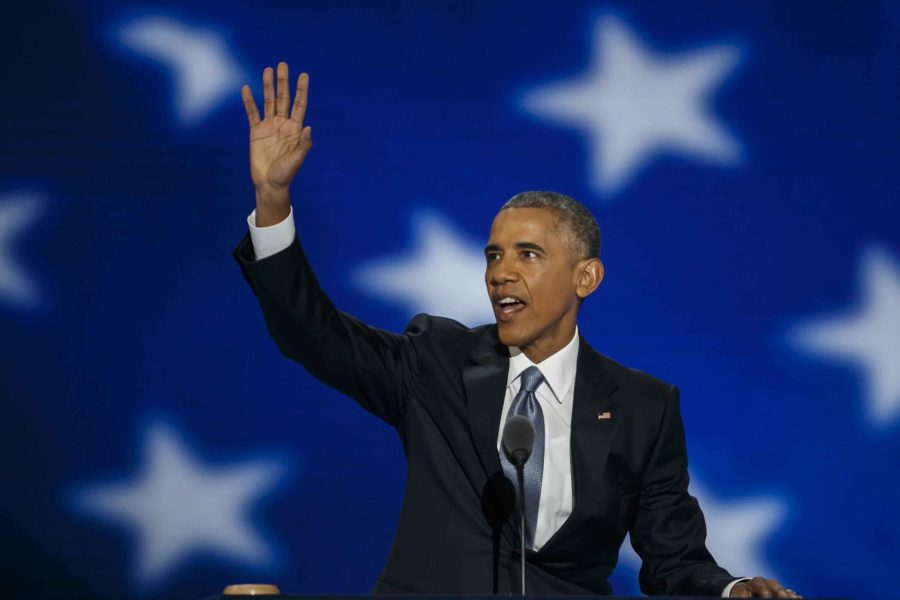US history is glorious but messy, Obama says at African American museum opening
President Obama speaks during the third day of the Democratic National Convention at the Wells Fargo Center in Philadelphia on Wednesday, July 27, 2016. (Marcus Yam/Los Angeles Times/TNS)
September 25, 2016
WASHINGTON — The American struggle to celebrate progress while pushing for more equality and opportunity is also the story of black America, President Barack Obama said at the opening of the Smithsonian’s National Museum of African American History and Culture.
“That’s what this museum is about. I too am American,” Obama said on Saturday. “It is a glorious story, the one that is told here. It is complicated and messy and full of contradictions, as all great stories are.”
The president said he hoped the museum on Washington’s National Mall, with its thousands of artifacts chronicling centuries of black oppression and perseverance, would show all Americans that “even in the face of unimaginable difficulty, America does move forward.”
Advertisement
“Perhaps it can help a white visitor understand the pain and anger of demonstrators in places like Ferguson and Charlotte,” Obama said. “But it can also help black visitors appreciate the fact that not only is this younger generation carrying on traditions of the past, but within the white communities across the country we see the sincerity of white law enforcement officers.”
The museum, the president said, “shows context for the debates of our time.”
MORE: New African-American museum in DC was 100 years in the making
Obama’s audience included House Speaker Paul Ryan, a Republican, seated next to a predecessor, Rep. Nancy Pelosi, a Democrat, and former Presidents Bill Clinton and George W. Bush. Presidential candidates Hillary Clinton and Donald Trump, were absent.
Racial issues have been a source of tension for Obama throughout his two terms in the Oval Office, as the nation’s first black president sought to reconcile efforts to unify the country with persistent disparities in living standards and in the criminal justice system.
Obama created controversy in 2009, early in his first term, when he said a police officer “acted stupidly” by arresting Harvard University professor Henry Louis Gates, Jr., who is black, at his home in Cambridge, Mass.
After that, Obama seemed reluctant to wade into racial issues and was criticized by some civil rights leaders. That changed after the nation was rocked after including the 2012 killing of Trayvon Martin, an unarmed black teenager shot in Florida by a neighborhood watch coordinator who was later acquitted of murder charges.
Advertisement*
Protests also erupted in Ferguson, Mo., after the 2014 police-involved shooting of black teenager Michael Brown, and in Baltimore in 2015 after Freddie Gray died while being transported in a police van.
In recent years, Obama has met with leaders of the Black Lives Matter movement and spoken in detail about how he empathizes with blacks profiled by law enforcement. The father of two daughters, Obama memorably said in a White House Rose Garden address that if he had a son, the boy would look like Martin, and discussed instances during which he had been racially profiled.
MORE: Globalism is here to stay and the world must address its shortcomings, Obama argues at the UN
Obama said the museum would not “eliminate gun violence from all our neighborhoods or immediately assure justice is colorblind,” and that given how recent Jim Crow laws and other discriminatory policies are, the nation “shouldn’t be surprised not all the healing is done.”
“Hopefully this museum makes us talk to each other,” he said. “And more importantly listen to each other. And most importantly see each other.”
The museum occupies what was the last open land on the National Mall between the Washington Monument and the U.S. Capitol.
Created by an act of Congress in 2003, it’s the only national museum devoted solely to documenting the life, history and culture of blacks in the U.S.
___
(c) 2016 Bloomberg News
Visit Bloomberg News at www.bloomberg.com
Distributed by Tribune Content Agency, LLC.
Advertisement









